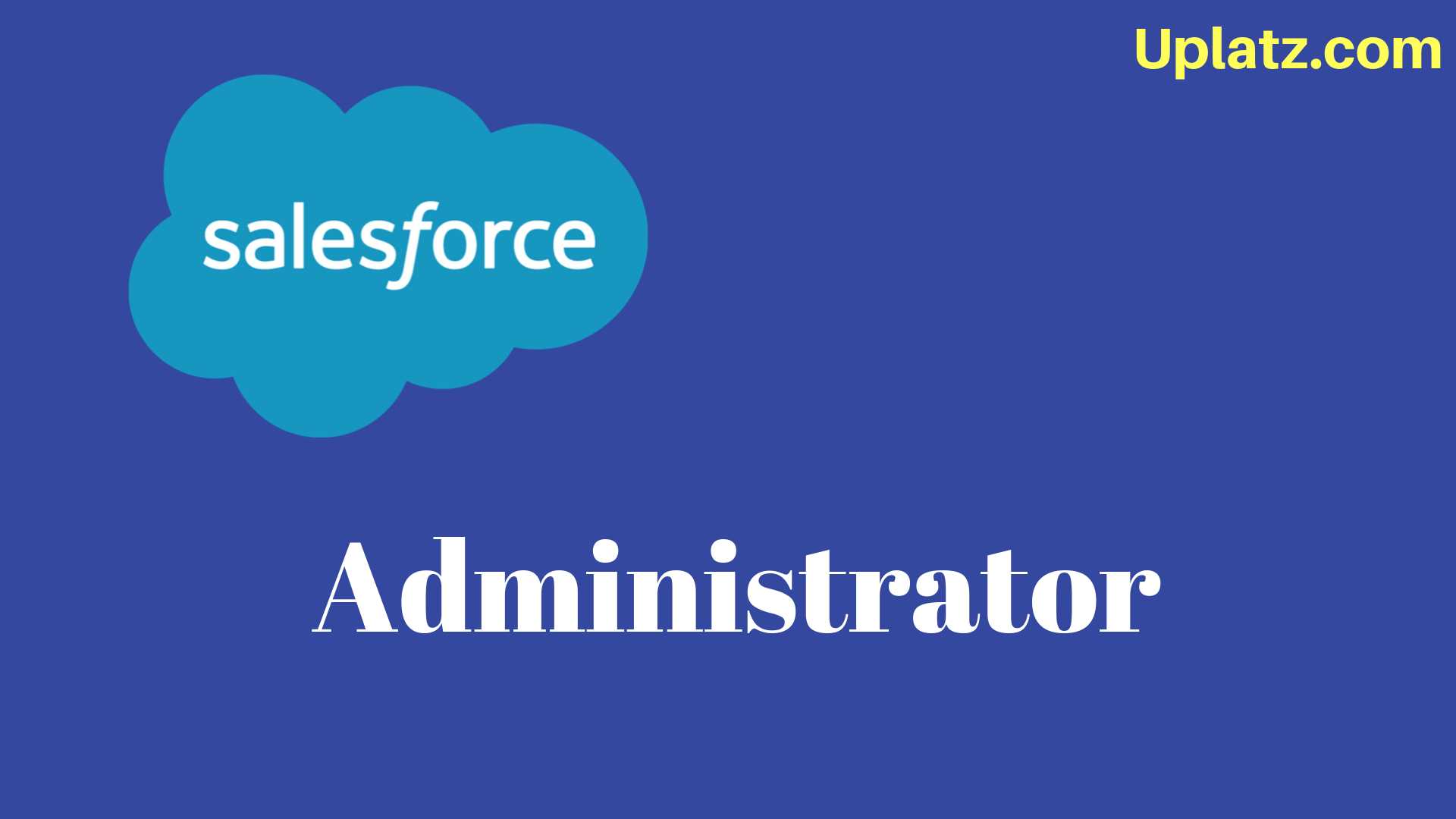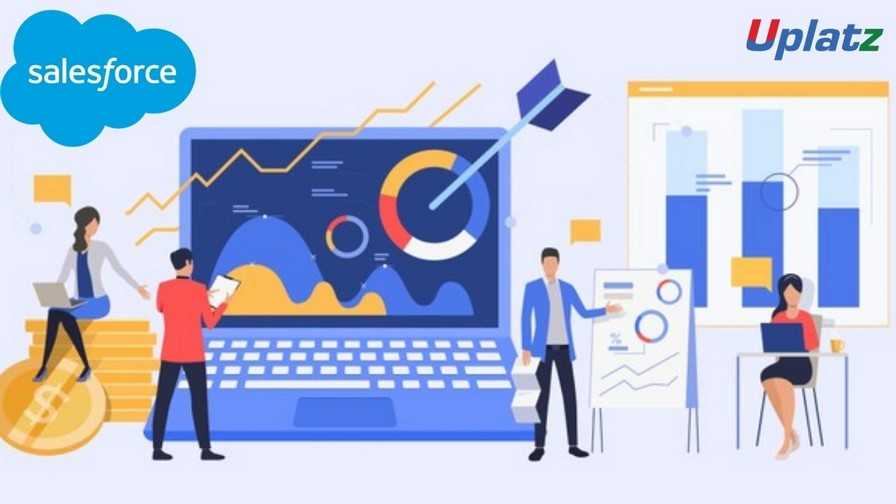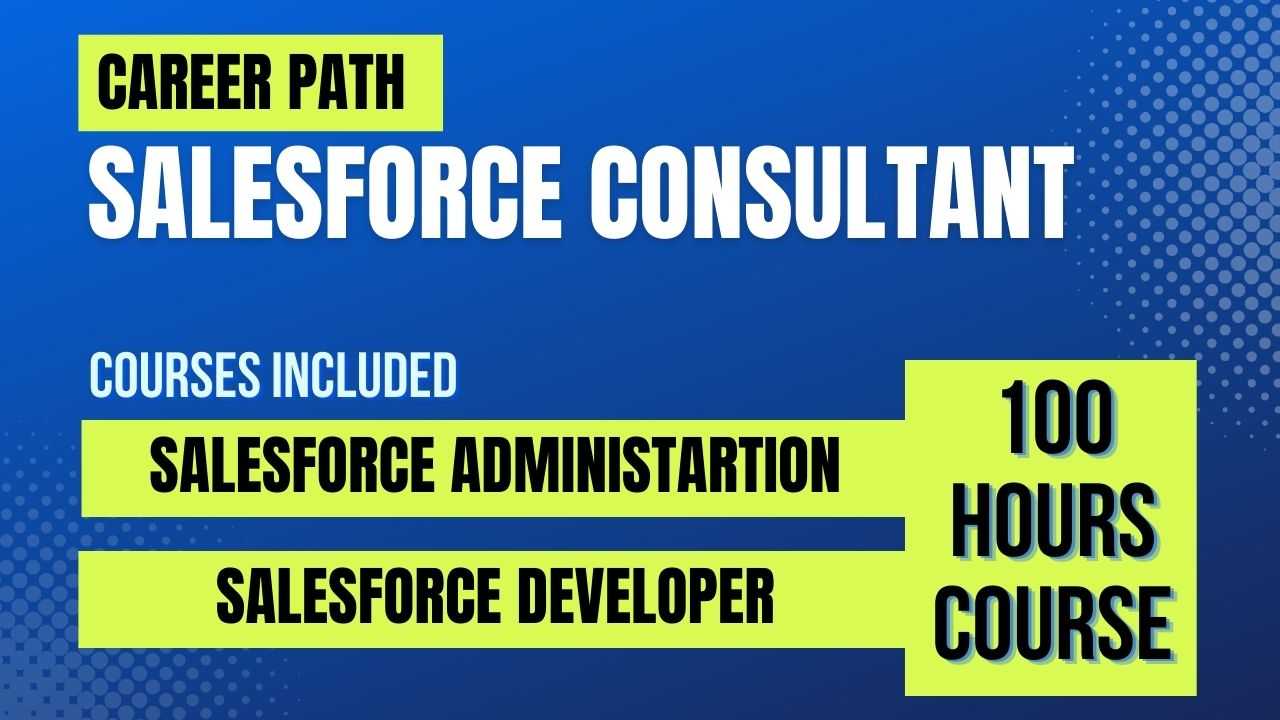Salesforce Developer
Learn how to extend Salesforce features using the declarative and programmatic capabilities of Apex code and Visualforce UI framework.Preview Salesforce Developer course
View Course Curriculum Price Match Guarantee Full Lifetime Access Access on any Device Technical Support Secure Checkout Course Completion Certificate 85% Started a new career
BUY THIS COURSE (
85% Started a new career
BUY THIS COURSE (GBP 12 GBP 29 )-
 60% Got a pay increase and promotion
60% Got a pay increase and promotion
Students also bought -
-

- Salesforce Administrator
- 5 Hours
- GBP 12
- 230 Learners
-

- Salesforce Administrator (basic to advanced)
- 16 Hours
- GBP 12
- 8713 Learners
-

- Career Path - Salesforce Consultant
- 100 Hours
- GBP 32
- 452 Learners

A Salesforce Developer specializes in using the Lightning and Apex programming languages to design and implement solutions within the context of the Salesforce platform.
A Salesforce Developer may be in charge of:
1) creating customized applications and improving existing ones,
2) designing technical architecture and building or optimizing a database,
3) analyzing customer needs and advocating for suitable technical solutions,
4) writing technical and functional documentation,
5) automating business tasks,
6) keeping up with changes in Salesforce tools and software products.
This Salesforce Platform Developer Certification Training by Uplatz is designed to ensure that you master the concepts and components of application development on the Salesforce Platform. Salesforce Developer training will help you understand how to extend Salesforce features using the declarative and programmatic capabilities of Apex code and Visualforce UI framework.
This course prepares you to certify as a Salesforce Platform Developer and bring custom cloud-based solutions to the world. Certified Salesforce developers earn on average over $125,000 per year, so join this bandwagon to chart a lucrative career path now.
Course/Topic - Salesforce Developer - all lectures
-
This Salesforce developer training video will give you an introduction to the development aspects of Salesforce.
-
In this session which is a strongly typed object-oriented, on-demand programming language.
-
A trigger is the piece of code that executed before and after a record is Inserted/Updated/Deleted from the force.com database. Apex can be invoked through the use of triggers. A Trigger is a functional action which gets on particular events.
-
In this session I want to review the order in which things happen when I save a record in Salesforce. This is important to understand if you are an app builder who works automating processes as well as if you are a developer that writes trigger code.
-
Here in Visualforce Tutorial, in which we are providing information about, how to work with visual force pages. Hope this will help you to understand basic of visual force pages.
-
Visualforce is a markup language that allows defining user interface components in Salesforce. This is a very interesting tool which runs o force.com platform.
-
In this demo, we are providing basic examples of some of the visual force tags that are used commonly in our visual force development.
-
A custom controller is an Apex class that uses the default, no-argument constructor for the outer, top-level class. You cannot create a custom controller constructor that includes parameters.
-
The Apex testing framework enables you to write and execute tests for your Apex classes and triggers on the Lightning Platform. Apex unit tests ensure high quality for your Apex code and let you meet requirements for deploying Apex.
-
This tutorial is targeted for Salesforce programmers beginning to learn Apex. This will bring you to an Intermediate level of expertise in Apex programming covering all the important aspects of Apex.
-
In this session, we will learn about writing asynchronous process in Apex using Apex
-
Asynchronous Apex, we all know how sometimes Salesforce Governor Limit can haunt us at times. With the limited amount of resource available due to the multi-tenant architecture, we have to restrict our self with the optimum usage of the resources.
• Learn the Basic concept in theory of the Salesforce and Cloud Computing
• Learn, how to build a custom app on Force.com platform, different licenses in SFDC.
• Learn how to configure Salesforce to collect, analyze, and retrieve vital customer information and create applications using Salesforce Lightning.
• Know about Cloud computing concepts, SaaS, PaaS, IaaS – Service model, Public, Private, Community, and Hybrid Cloud models.
• Know about Salesforce CRM and its functions.
• Learn working with Salesforce Cloud.
• Learn deploying reports, dashboards and portals in salesforce.
• Learn salesforce Object Query Language (SOQL).
• Know about data validation, app customization, and data debugging.
• Know about data models, security, UI and business logic.
• Expertise in MVC architecture.
• Learn Salesforce Standard List Controller.
• You will also get an introduction to Salesforce Platform and its different development tools.
1. Basics of programming
Variables
Operators
Expressions
Looping Statement
Controlling Statement
Class
Objects
Functions
2. Basics of Salesforce programming
Architecture Apex / Force.com
Data Types in Salesforce
Collections
List
Set
Map
Debug process and methodology
3. Building logic through programming
APEX Class
Triggers in Salesforce
Invoking Apex classes from Triggers
Trigger handlers
Trigger Scope
Trigger Types
Trigger Events
Best Practices Triggers
Governor Limits
Understanding Trigger Context Variables in Salesforce
Trigger.New
Trigger.Old
Trigger.New Vs Trigger.Old
Trigger.NewMap Vs Trigger.OldMap
4. Testing in Salesforce
Understanding Test Classes in Salesforce
Building Test Classes and execution
Code coverage understanding
Annotations
Data Manipulation Language
DML Statements
Insert statement
Update Statement
Delete Statement
Getting data from recycle bin
MVC pattern in Salesforce
Introduction to Visual Force
Enabling VF for your Organization and Execution
Creating First VF page
5. Working on UI with Visualforce Pages
Building Page Block Table in VF page
Building Form in VF page
Apex:PageBlockSection and apex :PageBlockSectionItem
Input Components
InputText
InputField
OutputLabel
Controllers
Types of Controllers
Standard Controllers
Custom Controllers
Controller Extension
Rerender
With sharing
Without sharing
VF page with multiple extension class
Best Practices Visualforce
Bulkification
Exceptions
6. Query Languages
Intro to SOQL
Query formation in SOQL
Intro to SOSL
Query formation in SOSL
DML statements in Salesforce
SOQL vs SOSL
Aggregate functions
SOSL transformation
Relationship query
Query on parent to fetch child data
Query on child to fetch parent data
7. Advance APEX
Batch class
Using Start()
Using Execute()
Using Finish()
Batchable interface
Understanding BatchableContext
Schedule Class
Schedulable interface
Calling batch from schedule class
Scheduling using CRON job
Transaction Control
Rollback
Savepoint
This Salesforce Developer training course will help the participant to master the concepts of application development in the salesforce. As a part of this Salesforce Developer training, the participants can explore salesforce, the cloud-based CRM tool and bring out customised cloud-based solution.
In Salesforce Developer Course module, the participants understand the Application Development concepts. In the Salesforce Developer course, the participants will learn to implement the application development concepts such as application creation, create customized applications, business task automation, salesforce fundamentals and tracking the changes in salesforce tools and products.
The Salesforce Platform Developer get trained to build an application on the salesforce platform aswell. The Salesforce Developer tutorial helps the participants to fulfil the role of a Salesforce Developer. The Salesforce Developer training course requires none of the prerequisites.
The Salesforce is a cloud-based computing software which is available in cloud which does not require any software or hardware installation. The Salesforce Developer training course from Uplatz can help the participants to understand the Salesforce fundamentals and development concepts. The Salesforce Developer training course validates whether the participants can understand the core application development features of salesforce technology.
Uplatz online training ensures the participants to successfully go through the Salesforce Developer training course. Uplatz provides appropriate teaching and expertise training is provided to equip the participants for implementing the learnt concepts in an enterprise.
Course Completion Certificate will be awarded by Uplatz upon the completion of the Salesforce Developer course.
The Salesforce Developer draws an average salary of $125,000 per year depending on the knowledge and hands-on experience. The Salesforce Developer job roles are in high demand and make a promising career.
The Salesforce Developers have huge demand across various MNCs. The involvement of salesforce cloud ecosystem in various companies can open up good job opportunities. The leading companies hire Salesforce Administrator considering their skill of mastering the concepts and components of application development on the salesforce. The Participants earn Salesforce Developer training through our course completion certificate.
The Salesforce Developer course is ideally designed for developers and for delegates who aspire to build their career in Salesforce Development.
After pursuing Salesforce Developer course, the participants can pursue a wide range of career paths.
The following are the job titles:
· Salesforce Developer
· Salesforce Developer Associate
· Software Developer
· Application Developer
Salesforce Developer course is worth for any developers who want to improve their development skills.
1. What is the difference between a role and a profile?
Profiles & Roles are both features that can be added to a user record in Salesforce. Roles are optionally added while Profiles are a basic requirement of setting up a user.
Profiles help to control object privileges such as CRED (Create, Read, Edit, Delete). They also contain system permissions that a user can carry out such as exporting data.
Roles on the other hand help with sharing records across an organisation. They work in a hierarchical fashion, giving users access to records that are owned by people lower down in the hierarchy.
2. Name three types of object relationships available in Salesforce?
There are three main relationship types in Salesforce
A lookup relationship can be used to link two objects together. It is the most basic type of relationship that creates a child-parent relationship between two objects.
A master-detail relationship can also be used to link two objects together. A master-detail relationship creates a tight relationship between the parent and the child. The child record inherits the security of the parent, and if the parent is deleted, all associated child records will also be deleted. Master-detail relationships created some extra functionality such as roll-up summary fields that allow you to calculate data on the parent from the children.
A many-to-many relationship (Also referred to as a junction object), allows you to create a relationship between two objects that need to model a many-to-many relationship. These are created with an object that has two master-detail relationships to two parent objects.
3. What is SOQL used for?
SOQL stands for Salesforce Object Query Language. It is very similar to the widely used language SQL (Structured Query Language), to query databases. SOQL is specifically designed for Salesforce data and is used to query the Salesforce platform to retrieve data. SOQL is used within Apex & Visualforce to return sets of data.
4. What are the differences between Programmatic & Declarative development?
Programmatic refers to development where a developer is writing code to achieve a task. This could include, but is not limited to, Apex, Visualforce & Lightning Web Components.
Declarative refers to “clicks not code” development, where individuals can build UI’s and automation using tools such as Process Builder & Flow.
5. What options are available to you for deploying from Sandbox to Production?
There are various ways to deploy from Sandbox to Production. The main way is to use a Salesforce feature called Change Sets. These allow you to package up components and then deploying them to another Salesforce Org. You can also use the ANT Migration Tool.
However, it is also good to be aware of the current Salesforce DevOps trend that is happening. There are a lot of Apps that make deploying changes to Salesforce a lot easier than current available options
6. How do Salesforce Releases work?
Salesforce has three releases a year that are named after the seasons, these include Spring, Summer & Winter. These releases contain a huge amount of new functionality across all Salesforce products, including changes to development languages.
Salesforce announce releases months in advance, as well as provide a chance to test new changes in a sandbox before the release date.
7. What is Apex?
Apex is a strongly typed, object-oriented programming language that allows developers to extend the Salesforce platform by writing their own business logic into the platform. Apex looks similar to Java and can be launched through a variety of user-initiated events such as record updates, button clicks, triggers on objects, or external web service requests.
8.Can you customize Apex in a production org?
Apex cannot be customized in a production Org, it must be changed and deployed through a sandbox and meet test coverage requirements.
9. What are the two options for when Apex Triggers can run?
Apex Triggers can either run before a record has been saved of after. A “before” operation is usually used to verify information that is going to be inserted, and an “after” trigger is used to access data that has previously been entered by a user or system.
10. When should Apex be used over Workflow rules or Process Builder?
There are many reasons why you should use Apex over declarative automation options, here are a couple of common answers…
Workflow rules and Process Builder operations sometimes have feature limitations that can be overcome with Apex. For example, pulling information from an external system.
When dealing with certain or large sets of data, Apex can be more efficient than declarative options due to less limitations.









